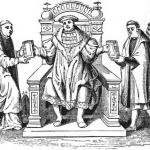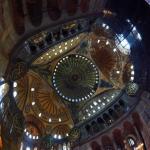Three weeks ago, on Easter Sunday, our parish church was packed to the gills: every seat was filled and people stood 2 and 3 deep against the back and side walls. In my memory, other churches have always been very full on Easter Sunday, but this was striking to me. And it got me thinking: how should a pastor respond to this annual influx into Church? Pastors generally issue a generic Easter greeting to everyone present, and I think I have heard a pastor welcome people visiting family from out of town. But, to the best of my recollection, I have heard only one pastor say anything that called attention to the seasonal turnout. This was in a small parish in Oakland, and the pastor made a joking reference that Mr. X., a universally beloved figure in the parish who chaired our finance committee (and so helped count the collection), was hoping that there would be as many people in church the next week. And, though I was not there to confirm it, I strongly suspect that the pastor of my former parish repeated his weekly comments that non-Catholics and Catholics who have not been attending mass weekly should not receive communion.
The presence of so many people on Easter (like at Christmas and on Ash Wednesday) is, shall we say, the 800 pound gorilla in the room. Or maybe we should use some other image denoting not one large but ignored creature, but large number of ordinary sized but still ignored creatures. (The 800 antelopes in the room?) We make jokes about this: I am pretty sure that most regular attendees have heard semi-humorous references to the presence of “Poinsettias and Easter Lilies” in church. This is not particular to Catholics: in graduate school my evangelical office mate shared similar stories with me.
It is easy to question the motives of people who only come to mass at Easter; indeed, for some it may be only a quaint social custom that defines the holiday, but one without any transcendent meaning: “He is Risen!” is something that is said but not believed. However, to be fair, there may very well be people who attend mass weekly for similarly weak reasons: Especially here in the South, church membership and regular attendance are taken as measures of social virtue, though I suspect similar worldly reasons are present everywhere. In charity, however, we should give them the benefit of the doubt. They made the effort to come, and in many cases have wrestled small children (or surly teenagers) into dress clothes for the occasion. The act of doing so has meaning for them. The full depths of that meaning may be obscured or lost, but something about the Easter mass still speaks to them. It is an echo of what Augustine said in his autobiography: “Our hearts are restless, Lord, until they rest in you.”
So given this surge in attendance, and the longing in their hearts that it might reflect, what should a pastor say? Should he say anything? I have been thinking about this since Easter and though I have not come to any definite conclusions, I keep coming back to a gut feeling that a pastor should say something, even though it may be hard to say the right thing. The pitfall is obvious: it would be far too easy for this to come across as some kind of chastisement: “you are here now, but where are you the rest of the time?” Or perhaps as condescending: “so good of you to join those of us who manage to come every week.” Or simply as unwelcoming.
But, nevertheless, this seems to be to be too great an opportunity for a pastor to not to take the risk. Pope Francis has insisted that a pastor should be down in the dirt, acquiring the smell of his flock. And on Easter Sunday, a very large segment of his flock has willing come to him. I think a pastor should acknowledge them and their presence. I am a relatively direct person, so were I a pastor, I might say something like this at the end of mass:
On this Easter morning, I want to welcome each and every one of you to our parish. Some of you are familiar faces. Thank you for your presence. Others among us are here because you are visiting friends or family in our parish. Thank you for being here. And some of you are here because today’s mass means something to you, and you have come on this day to share in this celebration. You are doubly welcome and as your pastor I am very happy that you are here. I also want you to know that you are always welcome here. On this Easter Sunday, when Christ rose triumphant from the grave, may God in his goodness bless all of you with Easter joy. He is Risen!
It is not much, and could probably use some polish. But what do you think: what should a pastor say?
















